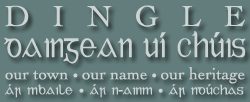|
Dingle: Our Town - Our Name - Our Heritage
DINGLE DAINGEAN UI CHUIS.
If you would like more information about the Dingle peninsula, please visit the Dingle Peninsula Web Site.
|
|
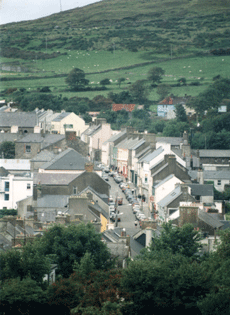
Main Street, Dingle |
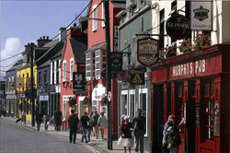
Strand Street, Dingle |
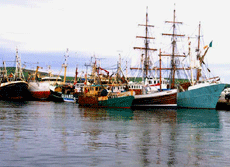
The Fishing Fleet, Dingle Harbour |
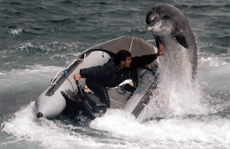
Fungie, Dingle Harbour |
|
|
|
|
|
Environment (Miscellaneous Provisions) Bill 2011: Second Stage
(section 48 placename provisions)
Seanad Debate extract.
Tuesday, 26 July 2011
Deputy Phil Hogan: Section 48 of the Bill provides for the substitution of a revised and updated Part 18 of the Local Government Act 2001 for the existing Part 18 dealing with placename provisions. Other than section 197, the remaining provisions of the existing Part 18 have not been commenced due principally to the difficulty of local government law and the Official Languages Act 2003 working in harmony. In the absence of commencement, the Local Government Act 1946, as amended, provides the relevant statutory framework.
The new Part 18 will restate large elements of the existing code but with significant changes and some new provisions. In an effort to streamline the legislation, it will provide that the placename provisions are contained within one section, as opposed to four sections of the 2001 Act. Any proposal adopted by a local authority to change a placename must specify the proposed name in Irish only or in English and in Irish; there will be an explicit requirement that any plebiscite held must be by way of secret ballot; and all proposals will require a resolution adopted by half of the members of the council.
[850]The incompatibility between local government law and the Official Languages Act has been brought into sharp focus through the long running controversy in respect of the name of An Daingean, or Dingle, and the amendment will also look to solve that particular problem in section 191 of the new Part 18. As Senators might recall, the official name of Dingle was changed to An Daingean by the Placenames (Ceantair Ghaeltachta) Order of December 2004 made by the Minister for Community, Rural and Gaeltacht Affairs under the Official Languages Act 2003.
As is well documented at this stage, the change in name has provoked a long running controversy with significant opposition locally based on a perceived lack of consultation prior to the making of the placenames order and the wish to preserve the name Dingle from a tourism perspective. A campaign was established to change the name of the town to Dingle Daingean Uí Chúis under the change of placename provisions of the Local Government Act 1946, as amended to which I referred earlier.
In September 2005, the Attorney General advised that the local government code may not be used to change the name of a place already subject to a placenames order, as in the case of An Daingean and this advice was notified to Kerry County Council which is the sponsoring authority for such a procedure under local government law. Notwithstanding the advice, the council proceeded to hold a plebiscite under the Local Government Act 1946, as amended, to ascertain whether the majority of qualified electors in the town consented to an application being made to the Government for an order to change the name of An Daingean to Dingle Daingean Uí Chúis. The proposal put to the electorate was carried overwhelmingly and Kerry County Council then resolved to apply to the Government to make an order under section 77 of the Local Government Act 1946 to change the name to Dingle Daingean Uí Chúis. However, in view of the earlier advice of the Attorney General, it was not possible to accede to the council’s request.
Subsequent efforts by the previous Government to introduce legislation to deal with this issue were unsuccessful and I am, therefore, availing of the earliest possible legislative opportunity to undo the impact of the 2004 placenames order as it applies to An Daingean and to provide, in law, that the name of the town in the English language will be Dingle and in the Irish language will be Daingean Uí Chúis.
Of more general application, as I have mentioned, the proposals before the House today provide a more coherent, modern and streamlined set of procedures for the changing of placenames. They allow for greater recognition to be given to the Irish language generally when placename changes are proposed and they set responsibility for this function at local level, where it should properly reside.
This Bill reflects the Government’s intention to address at the earliest opportunity, a range of pressing issues within the remit of my Department. I want to make progress in a number of areas where uncertainty has too long prevailed. I am providing certainty in terms of the landfill and plastic bag levies, I am dealing with the ratification of the Aarhus Convention, and I am addressing the long-running issue of placenames.
I look forward to the co-operation of Senators in facilitating the passage of this Bill and to their contributions to the debate. I commend the Bill to the House.
Senator Paul Coghlan: I welcome this Bill, particularly section 48, which amends the Local Government Act 2001. The new section 191(1) of the 2001 Act will provide:
The townland, civil parish, electoral division and non-municipal town that, immediately before the commencement of this section, was known (pursuant to the Order of 2004) as An Daingean shall, from such commencement, be known, in the Irish language, as Daingean Uí Chúis and, in the English language, as Dingle.
I welcome the Minister to the House and, like the people of the great county of Kerry and everyone involved in tourism there, I thank him for this change. I would like to say it is timely, but it is long overdue. Regardless, he moved as quickly as he could. The name was to be amended some time ago under the previous Administration’s Dublin mayoralty Bill, but that Bill lapsed and, thanks to the Minister, the Dingle provision has been included in this Bill, which the House will pass today. I express the gratitude of everyone in Dingle. When I visited it two weekends ago, this was the first question I was asked. I have received a number of telephone calls since from people who had heard about the Bill and were confused about whether the matter would need to be referred to the local authority, but such a referral is not envisaged. In the Minister’s response, I am sure he will clarify that the matter will be in order.
As the House knows, this question was democratically decided by the people of that town in 2006 when a plebiscite was carried overwhelmingly. I also thank my colleague, Councillor Séamus Cosaí Fitzgerald of Dingle, who campaigned for a long time to have the people’s wish for a plebiscite upheld. As the Members at the time will recall, former Senator O’Toole and I were often like a duet in the previous Seanad in seeking to have the confusion ended. Tourists could not recognise that the “An Daingean” on sign posts referred to Dingle. As we know, Dingle is an internationally renowned name, as is Killarney. While we are fond of Cill Airne and the Minister has made provision for the Irish language, we approve of his move to have both English and Irish placenames used in future changes.
As Dingle is an internationally known brand name, not having it on sign posts has led to considerable confusion. There are many stories of people travelling extra miles needlessly in trying to reach Dingle. It is good to know that maps, sign posts and so on will be put right and that both “Dingle” and “Daingean Uí Chúis” will be displayed. I recognise what the Minister has done. A victory for democracy, he has followed the plebiscite’s decision and put matters right.
|
|
|
